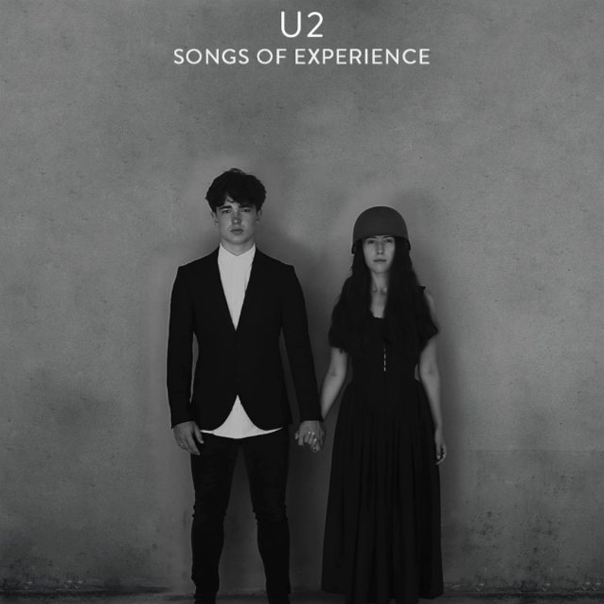ALBUM REVIEW: Mortality looms large over U2’s ‘Songs of Experience’

U2, “Songs of Experience.”
After a much-ballyhooed delay, Songs of Experience, U2’s 14th studio album, has arrived. And thank the gods of rock and roll: it’s very, very good indeed. I need to sit with an album for a while before ranking it in the pantheon of U2 albums, but some have proclaimed it’s their best since All That You Can’t Leave Behind. Or since Pop. Or, in one eyebrow-raising instance, since Achtung Baby. Fans’ mileage may vary.
Songs of Experience
U2
Dec. 2
Songs of Experience was to be released not long after 2014’s Songs of Innocence, planned as dual works inspired by William Blake’s Songs of Innocence and Experience. In typical U2 fashion, it got pushed out a bit, and then a bit more, and then came fall 2016. You know, the band said—and I am paraphrasing—with everything going on in the world, we want to take a little more time.
But behind the scenes, the real reason for the delay was something far more personal and frightening: a serious health scare for Bono. The singer has been uncharacteristically mum on details, leading fans to worry and wonder if the end was near for U2. Whatever this incident was, it may have been the best thing to happen for Bono’s songwriting. Over the years, he has shifted from the abstract to the personal, with varying degrees of effectiveness. His brush with mortality led him to pen lyrics as letters to his loved ones. What would you say if you thought you were on your way out? Rarely have his lyrics felt so immediate and real.
The journey begins with “Love Is All We Have Left,” an intriguing atmospheric introduction, full of synth tremolo and Bono crooning in his lower register. He uses it a few times on the album, and it’s a welcome development. This song has the first callback to Songs of Innocence, a mostly effective gimmick to tie the two records together. Here, an AutoTuned voice shimmers “there is a light,” a lyric used on the previous album’s “Song For Someone,” and is heartbreakingly repeated at the end of the album.
Or are these lights the “Lights of Home?” A proper U2 rocker, the lyrics reference his 2014 bike crash injuries: “I shouldn’t be here because I should be dead/ Thought my head was harder than the ground.” Adam Clayton borrows a HAIM bass riff to propel the song. HAIM joins in for the ending chorus, exhorting the narrator to “Free yourself to be yourself,” another flashback to Songs of Innocence.
But this is not a doom and gloom album. “You’re the Best Thing About Me” might be U2’s obligatory Please-Add-This-To-Your-Radio-Playlist track, but it’s full of joy, and darned if it’s not the catchiest thing they’ve written in years. It’s the first of two love notes to Ali, Bono’s wife of 35 years. On the delicate “Landlady,” she holds the keys to his heart and keeps him grounded.
After the lilting pop of “Get Out Of Your Own Way,” which reached even farther back to borrow its heartbeat from “Beautiful Day,” Kendrick Lamar appears to preach twisted Beatitudes, bridging into “American Soul.” Lamar sampled the song on his 2017 release DAMN.
While “American Soul” crashes in with exciting, stomping fuzz guitars, it’s a quick letdown as it reaches the chorus; the one callback that falls flat. To return to the Innocence throwaway “Volcano” makes no thematic sense. It also contains the one true lyrical clunker on the album, the unfortunate portmanteau “Refu-Jesus.”
Politics aren’t completely absent from the record. “Get Out Of Your Own Way,” “American Soul” and “The Blackout” all contain references to current events. One of the successes is that the album dips into the political without throwing the focus off the overall theme.
The breezy, minor-key “Summer of Love,” however, is not as subtle with its topic. Over acoustic guitars and Eastern-tinged strings, the narrator sits on the French Riviera and ponders the sea, where on another shore, refugees reach for escape over the same waters. It’s a powerful song.
The album takes another break for a moment of levity with “The Showman (Little More Better),” where the band sounds light-hearted without forcing an attempt at a hit song. This is Bono’s wink to U2’s fans, and it’s delightful. “I lie for a living, I love to let on/ You know you make it true when you sing along.”
Throughout the album, The Edge shies away from expected Edge sounds. There’s very little chimey, effect-driven guitar sound here, so it’s welcome when it finally appears at the end of standout track “The Little Things That Give You Away,” a song U2 road-tested on its recent The Joshua Tree tour. Starting with simple accompaniment, Bono’s lyrics describe waking up, wondering if he’s dead: “Sometimes the end isn’t coming/ The end is here.” The music has a quiet, building urgency throughout until Edge’s familiar ringing tones appear.
One final rocker appears: “The Blackout.” With its fuzz intro that is reminiscent of Achtung Baby and a classic U2 singalong chorus, this will inevitably be a standout live track.
The final two tracks are more letters from Bono. “Love Is Bigger Than Anything In Its Way” is anthemic U2 balladry on which Bono urges his four children on through the inevitable pain of life.
Album closer “13 (There Is A Light),” borrows the chorus of “Song For Someone,” repurposing the love song for someone else. The heartbreak comes when you realize that the someone else is a young Bono, on the cusp of losing his mother and facing a hole in his life that he will spend decades trying to fill.
Bono is fond of self-effacingly pondering whether the world needs more U2 albums. If Songs of Experience is the band’s direction going forward, the answer is “yes.”
